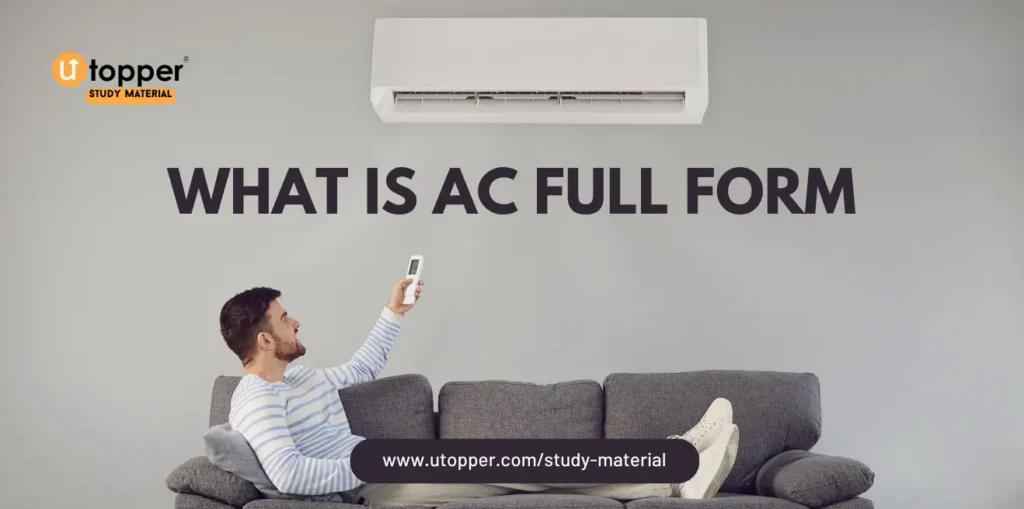AC FULL FORM: Understanding the Meaning of AC
Introduction
When it comes to home and office comfort, ACs are an essential appliance. They are a lifesaver during the hot summer months, providing cool and comfortable indoor spaces. In this article, we will explain what AC full form is and understand the history and science behind this appliance.
Read Other Full Forms

What is AC?
AC full form is “Air Conditioning.” It is a technology used to alter the temperature and humidity of the air in a room, vehicle, or building, to create a comfortable environment for occupants. Air conditioning systems work by removing heat and moisture from the air and replacing it with cool, dry air. The process of air conditioning can be achieved through various types of cooling equipment, including central air conditioners, window units, and portable air conditioners.
History of AC
The concept of air conditioning dates back to ancient civilizations, where people used to hang damp reeds on windows to cool down the air. However, it was not until the late 19th century that the first mechanical air conditioning system was developed. In 1902, Willis Carrier invented the first modern air conditioning unit to control humidity in a printing plant. Since then, air conditioning technology has evolved and become an essential component of modern life.
How Does AC Work?
Air conditioning units work by using a refrigerant to transfer heat from inside a room to the outside. The refrigerant is a chemical compound that changes from a gas to a liquid and back again quickly. The process of changing from a gas to a liquid absorbs heat, and changing from a liquid to a gas releases heat. The refrigerant is pumped through a compressor, where it is compressed into a high-pressure gas. It then flows through a series of coils, where it changes from a gas to a liquid, releasing heat in the process. The cool liquid refrigerant is then pumped back inside the room to absorb heat and start the cycle again.
Types of AC
There are several types of air conditioning systems available in the market, and each has its unique features and benefits. The most common types of AC include:
Central Air Conditioning Systems
Central air conditioning systems are designed to cool entire homes or buildings using a network of ducts and vents. They are highly efficient and can maintain a constant temperature throughout the building.
Window AC Units
Window AC units are standalone units that can be installed in a window or wall. They are ideal for cooling a single room or small area and are relatively affordable compared to other AC systems.
Portable AC Units
Portable AC units are mobile units that can be moved from room to room. They are ideal for people who want a versatile and convenient cooling solution.
Benefits of AC
ACs offer several benefits, including:
Comfortable Indoor Spaces
ACs provide cool and comfortable indoor spaces, making them ideal for hot and humid climates.
Better Air Quality
Air conditioning systems can help filter out pollutants and allergens from the air, improving indoor air quality.
Improved Sleep
Sleeping in a cool and comfortable environment can help improve sleep quality and reduce the risk of heat-related illnesses.
Conclusion
In conclusion, AC stands for air conditioning, a technology used to cool and dehumidify indoor spaces. The invention of air conditioning has revolutionized the way we live and work, making our lives more comfortable and productive. With the increasing demand for air conditioning, it is essential to choose the right type of AC system that meets your needs and budget.
Frequently Asked Questions
Q.1 What is the best type of AC system for my home?
The best type of AC system for your home depends on several factors, including the size of your home, your budget, and your personal preferences.
Q.2 How often should I service my AC?
It is recommended to service your AC at least once a year to ensure optimal performance and prolong the life of the unit.
Q.3 Can ACs be harmful to health?
While ACs can improve indoor air quality, they can also contribute to health problems if not properly maintained. Dirty filters and ducts can cause allergies and respiratory problems. Regular maintenance and cleaning are essential to prevent health issues.
Q.4 Can ACs save energy?
Yes, ACs can save energy by using energy-efficient models, proper installation, and regular maintenance. Additionally, using a programmable thermostat and setting the temperature higher when no one is home can also save energy.
Q.5 What is the ideal temperature for AC?
The ideal temperature for AC is between 22-25°C for optimal comfort and energy efficiency.

